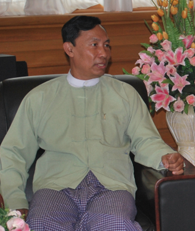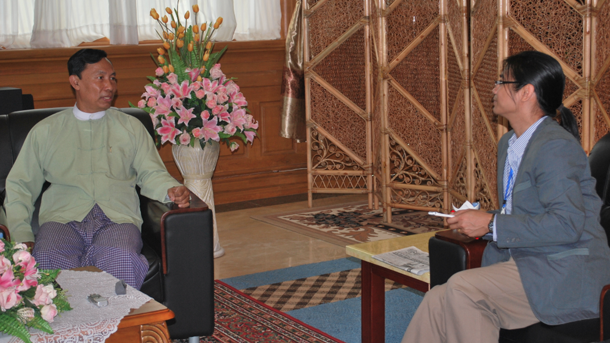Shwe Mann, the former general who now serves as the speaker of Burma’s Lower House of Parliament, said that the country’s legislature is thriving and that it, as an elected body, wields more power than the military-backed council led by President Thein Sein.
In an exclusive interview with Irrawaddy editor Aung Zaw last week, Shwe Mann said that the driving force behind reforms in Burma is the public, which voted for the Parliament in elections in November 2010 and by-elections in April of this year.
The people have “ultimate power,” he said, making the Parliament more influential than the 11-member National Defense and Security Council (NDSC), widely seen as the ultimate arbiter in matters affecting national policy.
The NDSC includes the president, both vice presidents, the speakers of both Houses of Parliament, the commander-in-chief of the armed forces and key cabinet ministers.
Shwe Mann, who toured several European parliaments last month, said he was pleased with the condition of Burma’s own legislature, which he described as being as active and dynamic as those he saw in the more established democracies of the West.
Concerning the landslide win of the opposition National League for Democracy (NLD) in the April by-elections, Shwe Mann said he welcomed the party’s participation in the political process, adding that it would make the coming session of Parliament even more dynamic.
The NLD won 43 out of 44 seats it contested in April. Aung San Suu Kyi, the party’s leader and the country’s democratic icon, has called for amendments to the 2008 Constitution, which grants a decisive role to the military in Burma’s political affairs. Among other measures, it sets aside 25 percent of seats in Parliament for military appointees.
Shwe Mann said, however, that the presence of the military in Parliament was in accordance with the Constitution, which he said was approved by the people—despite widespread condemnation of the way the May 2008 referendum was carried out.
“The public approved the Constitution, so the presence of the military personnel in the Parliament depends on the people’s desire,” he said.
The former general, who is also a member of a newly formed government peace committee, said he hopes to achieve an end to conflict with ethnic armed groups through negotiations. “Although we had to hold guns and fight in the past, now we have put aside our weapons,” he said.
On the subject of media freedom, Shwe Mann said that Parliament was working on a new media law, and that he welcomed the media’s suggestions and criticism of parliamentary actions.
The Lower House speaker, who has encouraged MPs to “have courage and speak out bravely,” said he respects the fourth estate and felt it should play a vital role alongside the executive, legislative and judicial branches of government.
Saying that the media plays a key role in spreading information, he added that “it is important for the media to instill respect for the rule of law” in the public.
It is weakness in the rule of law that is behind the current troubles in Arakan State, he said, referring to a wave of violence that has left at least 10 Muslims and seven Buddhists dead in a series of reprisal killings that followed the rape and murder of an Arakanese woman late last month.
In response to a question about his ambitions ahead of elections in 2015, Shwe Mann said: “My ultimate goal is to do whatever is best for the people and the country. Therefore, I am ready to accept any position that the public sees fit to give me.”
















